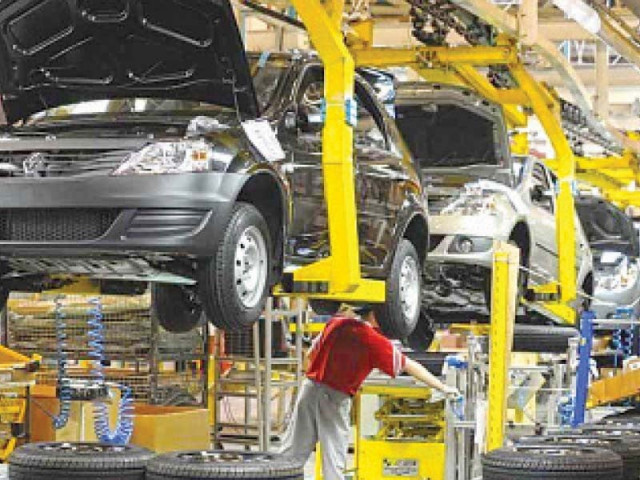Auto parts makers demand smooth energy supply
Absence of power supply, high gas tariff cause financial crisis for industry

Pakistan Association of Automotive Parts and Accessories Manufacturers (Paapam) Senior Vice Chairman Abdul Rehman Aizaz has called for smooth and uninterrupted power and gas supply to the industry at the competitive rates of Ogra.
Aizaz blamed absence of electricity supply from the national grid for the industry’s financial crisis as they were provided re-gasified liquefied natural gas (RLNG) at a high rate, which is “discrimination and injustice”.
Due to the prevailing gap of around 7,000MW in electricity demand and supply, the government is following a load management programme, Arif Habib Limited (AHL) Head of Research Tahir Abbas told The Express Tribune.
“Also, with the skyrocketing global energy prices, it is not feasible for the industry to produce electricity from LNG as its cost hovers around Rs30 per kilowatt-hour (kWh),” he said. The auto parts industry will try to pass on the impact to the original equipment manufacturers (OEMs) and eventually the OEMs will increase car prices, forcing the end-consumers to bear the brunt, he added.
Ismail Iqbal Securities’ auto analyst Muqeet Naeem said that the pricing power for the auto sector is quite low.
Read Auto sector to see golden age
“They can just pass on prices to protect their thin margins,” he said. “No extraordinary profits are earned by the auto companies.”
The Paapam senior vice chairman demanded that the government should direct Sui Southern Gas Company to provide K-Electric at least 130 million cubic feet per day (mmcfd) of natural gas at a tariff of Rs857 per mmbtu, as decided by the Oil and Gas Regulatory Authority (Ogra).
He was of the view that the existing gas being supplied to K-E, which is 100 mmcfd at RLNG rate, should be provided at the natural gas tariff as per high court order.
He appealed to the government to immediately notify SSGC to start billing K-E at Ogra’s approved indigenous gas tariffs, saving the domestic and industrial consumers of Karachi from discrimination and injustice.
He suggested to the government to rationalise fuel charges adjustment in electricity bills to safeguard the interest of 30 million residents and 40,000 industries of Karachi.
Residents and industry are facing calamities as RLNG is supplied at Rs4700/mmbtu to KE, resulting higher cost of electricity production and slapping the consumers with higher FSA and unit cost Rs40/, he added.
“It is impossible for 40,000 industries of city including small and medium enterprises to sustain their productivity at Rs40 per unit eventually industry will die, resulting in downfall of Pakistan economy,”said Aizaz.
He underlined that currently, 99% of fuel supply to KE is RLNG. Which is a violation of the Gas Load Management Policy approved by the Cabinet which prioritises public interest, decisions of the Cabinet Committee on Energy, and Honorable Sindh High Court Decision mandating provision of 190 mmcfd to KE with 130 mmcfd of Natural Gas at Natural Gas rates, he added.
There are factors other than electricity that are affecting the margins of the auto sector.
“Whether auto parts makers are getting expensive electricity or not, their margins will decline in any case,” said Topline Securities senior research analyst Sunny Kumar. “Their production will be affected for fiscal year 2023; we expect auto sales to down by 25% year-on-year.”
Sabir Shaikh an auto sector expert said all the industries are affected, but auto sector is on lower side. Assembling industry does not require much electricity, but some vendors who are manufacturers not assemblers required Electricity, he added.
Published in The Express Tribune, June 9th, 2022.
Like Business on Facebook, follow @TribuneBiz on Twitter to stay informed and join in the conversation.



1733130350-0/Untitled-design-(76)1733130350-0-208x130.webp)















COMMENTS
Comments are moderated and generally will be posted if they are on-topic and not abusive.
For more information, please see our Comments FAQ